[Interview] Gina Yong: Dads now ask the most questions in my breastfeeding classes
How did you become a breastfeeding advocate?
More than 20 years ago when I had my first baby, there was not much breastfeeding information at the time. We went for classes and all the midwives and nurses said was: ‘Just put the baby to the breast and don’t worry about anything.’ And they always ended advice with ‘If you cannot breastfeed, don’t worry about it – there is always formula milk.’ I attended classes over an hour long – 10-15 minutes was spent talking about breastfeeding and the other 45 minutes was about how to make formula. At the time I thought it was pretty normal. She was preparing us and what was there to learn about breastfeeding anyway? So when Damian was born in 1997, I was in a shock. Put the baby to the breast – it didn’t work that way! The first latch was so horribly painful, I gave up almost immediately. The nurses told me it was normal, you just have to let baby suck. I tried to do that but I suffered from sore and bleeding nipples. When I pumped, it wasn’t milk that came out, it was blood. I filled a bottle with blood instead of milk – it scared me. I think Damian only got two feedings of breastmilk.
Nobody tells you about that pain!
Yes, my second child however was born in the US. My husband got a job there in 1999 and we followed him. There the hospitals were a bit different, and the lactation consultant helped me to attach the baby – there was no pain. Oh wow, this is so good, I thought! I successfully breastfed her, but then I also fell into formula milk. Because I had no help, and had to look after Damian. You get so tired, and there was formula milk staring at me from the counter. I thought why not? So Stephanie was half-half. By the time she reached her full moon (one month), she slept from 7pm to 7am. I was like ‘Wow!’ But because of that (long sleep), my milk supply went down, so she was fifty per cent breastfed. Later I also successfully breastfed Josephine and then Jeremy. And then my husband lost his job and came back to Malaysia.
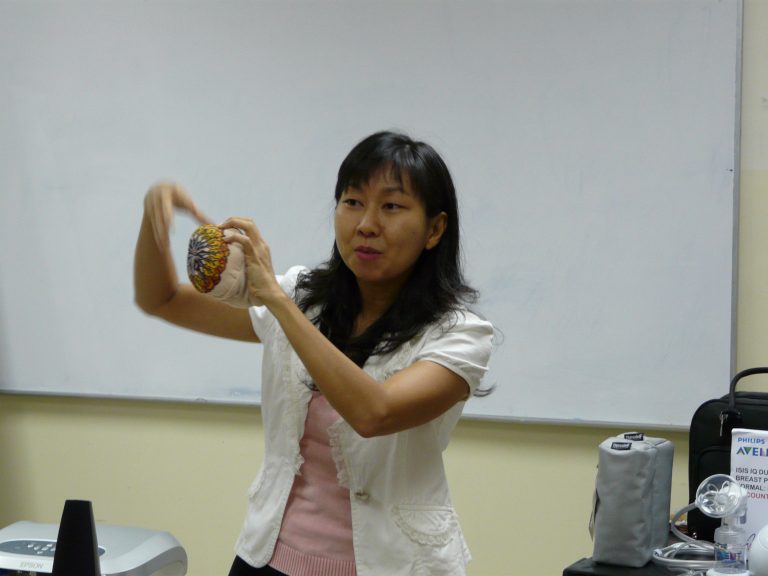
Gina in one of her classes in 2007
And then you started to teach mothers how to breastfeed.
I couldn’t find work. I was out of the workforce for too long, even though I was an accountant. One day I was visiting a friend who has delivered a baby in the hospital, and she told me she had not even seen her baby. How could that be? I called the midwife and head nurse, and said ‘Please bring the baby.’ They were very reluctant, but brought the baby. I helped her to breastfeed – she was very kaku (stiff) so I had to show her how to hold the baby and all. She got it and successfully breastfed in the end. The matron who was there was looking at me the whole time – and asked if I was a lactation consultant. I said no, I’m just a mother who knows how to breastfeed. She said she was having a class soon, and asked if I wanted to share what I knew with new mothers.
So I came back to the hospital and shared what I knew with that first group of 20 to 30 mothers. There were hardly any fathers at that time. And these women started getting my number. In the US when I was pregnant I was in a mummies’ support group and attended all sorts of classes on parenting and breastfeeding. It was very supportive and I learned how to talk to mothers. I wanted to support mothers so a friend connected me to the Ministry of Health in Malaysia, and I attended a 40-hour lactation course. And so I became a lactation counsellor. I learned so much. From then on hospitals called me up and asked me to give talks. But most of the hospitals, especially the private ones, never called me back after I went to talk there.
Why was that?
What I teach mothers was against hospital practice. For example, I said you must have skin to skin.
That’s basic!
Well ten years, or even just five years ago, it was not basic. It’s something they don’t want to do. Babies are taken away to be bathed and weighed, and although some hospitals allowed daddies to be inside, they weren’t allowed to touch the babies. Let’s say you have a C-section – the baby cannot be skin to skin, so you pass the baby to daddy. But hospitals didn’t allow this and they weren’t happy when I taught that. They didn’t call me back. There was a centre that eventually did though – Taman Desa Medical Centre. It was because I was free, and I learned how to tone down! So for three years I would give short talks as part of their antenatal classes. I thought, hey, I could do this.
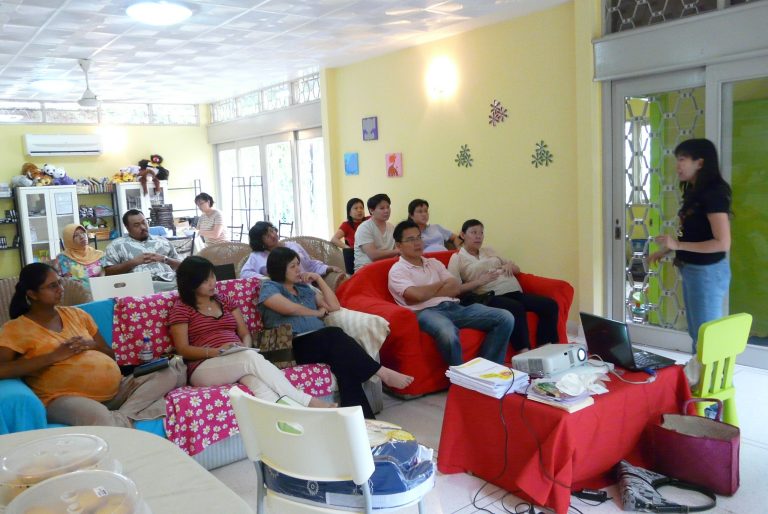
When the number of couples attending her classes slowly got better in 2008
My first ever class was RM20, in the medical centre. I had just one couple. When I saw them, my heart dropped, I was so demotivated. But it’s okay, I committed to teach, so I taught. After that I couldn’t afford training rooms – they cost RM150 – so I started teaching from the hall of my own home. For the next five years – from 2002 to 2007, I only got maybe a maximum of five couples! It was very depressing. I thought – why am I still doing it? My husband thought I should stop.
But I liked teaching. I thought if just one person needs me, and I can help her breastfeed, it means a lot. So I just wanted to keep at it. It slowly became ten couples, and by 2007 I was charging RM50 per couple.
And then TBAN (The Breastfeeding Advocates Network) happened.
I joined Facebook in 2009, and wow it was a boom! That was the year I set up TBAN. Within one night, I got 400 members. At first there was ‘Malaysian’ in our name, but there were so many people from Brunei, Singapore, Indonesia, even Germany – I couldn’t turn them away. So I changed it to The Breastfeeding Advocates Network. After that I attended courses and studied more – I even took the expensive health studies to become International Board Certified Lactation Consultant (IBCLC) certified. But I never took the exam. It was about ten years ago and it was too expensive for me at the time – the only place you could take the exam was Australia. I had small kids and I couldn’t travel there. In 2012, they changed the criteria – only medical professionals could take it. Or I could spend another three years studying for the exam. I decided not to take it, and so I am a Ministry of Health lactation counsellor. I prefer to call myself a breastfeeding counsellor, because I help people breastfeed.
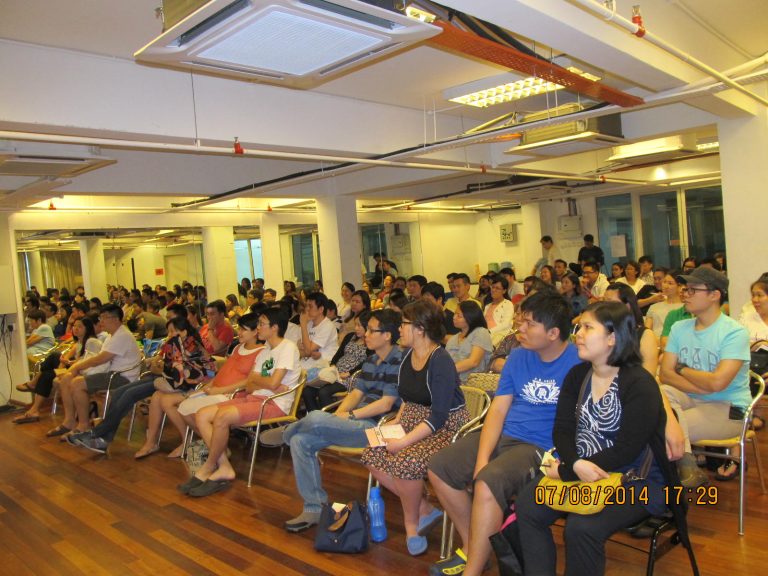
The packed hall of parents who come to hear Gina talk about breastfeeding in 2014
I felt the pressure was so immense – to breastfeed because they say it is so natural, and yet they also say it’s all fine to do formula. For me it was a strange and emotional time. Is that the main problem with new mums?
That is one of the main problems, yes. But what I’m observing in most mothers nowadays is actually a tidak apa attitude, that ‘it doesn’t matter.’ When you ask a pregnant mother if they have thought about how they will feed the baby, they say – if I can, I’ll breastfeed, if not then I will do formula. But I ask, would you like to learn how to breastfeed? I have a class. It’s always 90% mindset and 10% work. The 90% starts here – your mindset about breastfeeding. But if you start with ‘Can-lah, nevermind-lah, try-lah’, most of the time it won’t work. If you think, yes, I am going to do whatever I have to to breastfeed, it will work. Unfortunately, a lot of mothers don’t have that attitude.
Perhaps it is just that new mothers just don’t know enough?
That is one reason. Two is that I think we have become a very spoilt society – everything is instantaneous, it’s immediate gratification. You want information and it’s at your fingertips, you want food, people can deliver it to you – you don’t have to wait.
And breastfeeding is not like that.
It’s not like that. You have to wait for the baby to suck, wake them up, spend time on diapers and so on. A feeding session can last an hour, and mums are like – Oh my God, one hour, don’t I need my life? I said that to myself many times, so I understand. A lot of new mothers do not understand or accept the fact that this sitting and feeding your newborn is only a short time. That first month during confinement is actually the most important time to build a good milk supply, so you should sit down and relax with your baby. By the time your baby gets to one month, it gets easier. It will no longer be an hour. Suddenly, you’re only feeding your baby for ten minutes – and you have your life back! But this one month during confinement – it is so significant and so hard. It depends on the support of the people around them. And you have people like grandparents, saying don’t carry the baby too much, and things like that.
Yes! That’s so normal when it comes to the Asian support system. Don’t carry or spoil the baby too much.
They always ask – if I carry my baby too much will I spoil him or her? And I ask them – how long have you been married? If I ask your husband not to buy you any presents for your birthday, Christmas or Valentines – because there is no need, do not spoil her, do you think that is good advice? Of course not! I would be telling your husband not to care for you. And if we adults need love and care, what more your baby? You carry your baby for 9 or 10 months and now you want to put the baby down? Don’t carry the baby? They are so used to it and your movements, and when they are born and you don’t carry them, they cry! They cannot use words to say ‘Mummy, I need a hug.’ And you say, let them cry! And mums say ‘Yes, but my mother and grandmother say I’ll spoil the baby by carrying them.’ I tell them – if they tell you that, ask them how they would feel if you didn’t go and visit them. “You are an adult, you should take care of yourself. How would that feel?”
What other problems out there that mothers go through? I find that mums just worry about supply all the time.
Baby has grown, is putting on weight, and then somebody comes and says ‘Hey, how come your baby is so skinny?’ And suddenly they doubt themselves all over again. Or a doctor or nurse will say, your baby is not up to percentile and you should give formula milk. That is the number one problem – even if baby is doing very well and putting on weight, they still doubt themselves. Another thing is women usually come (to me) because of physical problems like mastitis or blocked ducts. Or tiredness. For new mothers, there is a lot of emotional or hormonal issues, because they are just tired and not prepared. And their husbands don’t know what to do. There is also the lack of sleep and constant worrying. Helping mothers get over the worry is work, because you don’t know what background they have – they could have had a miscarriage before, or this is their first baby after trying for 10 years. So we talk and I say, if you are that anxious, it doesn’t help anybody. You have to let go and learn how to trust.
Things are a lot better now, and people seem to be breastfeeding a lot more.
Twenty years ago when I had my first baby, breastfeeding was almost non-existent. I don’t know the rates then, but when I came back in 2002 I remember it was 13 to 14 per cent. So out of 100 people, only 13 or 14 people breastfed until 3 months. When I set up TBAN, the rate was still about 16 per cent. Now in 2017, there is no complete data or statistics, but we estimate from the grassroots and from the Health Ministry that it could be around 40 per cent. In 10 years it has grown tremendously, and you can see that from the baby fairs and pumps and nursing clothes being sold. I’d like to take some credit for this as TBAN is a breastfeeding society that supports other women to breastfeed. In 8 years, we have gathered 120,000 members. It shows we have done something right.
Any favourite memory when it comes to breastfeeding your children?
It’s all a blur. (laughs) I don’t have any breastfeeding photos at all for those I successfully breastfed. There is only one photo of my son who I failed to breastfeed. I looked shocked in that photo! But okay, one memory comes back – that I would go to sleep and lie down with my baby next to me because I was just too tired to bring him to the cot to me every night. And every night my baby would help himself – sometimes I wake up in the morning and not know if he drank or not. But this fourth baby was my biggest, so he must have drank something!

Gina and Damian, who only received two breastmilk feedings
Do you have any advice to the family and friends of a new mother? The mummy’s ‘village’, as it were.
First of all, get informed. Don’t just give advice based on what you hear, or what people say. Sometimes on TBAN, a mother asks a question, and hundreds start answering. But if you read through all the comments, there is quite some nonsense! And then some people will say ‘How do you know?’, and the answer is ‘It’s true because my mum said so.’ Get the correct or factual information before you pass it on. Also, be supportive, and say I am here for you. Don’t pass off your own opinions to other people. Also, comments about comparisons will always be there – if your baby is only 4kg, they will give you a look, saying their baby was 5kg at the same age. I got that a lot, I had four kids.
What about mums who just cannot breastfeed and feel horrible about it? My babies were both tongue tied, it was awfully painful and I almost gave up.
If it’s just tongue tie, it is easily released. We have a lot of tongue tied babies. Although they say it only affects 10 per cent of babies, I seem to see it all the time so I don’t believe it is just 10 per cent. But yes, doctors can help with that. However, if there are other issues, such as infertility, if they had baby through IVF, hormonal problems, or PCOS, then all that can cause mothers not to have sufficient milk. It is true, sometimes you try and you just don’t have enough milk. But there are alternative solutions. If it’s formula, there are many ways to give formula, such as tube (supplementary feeding) at the breasts, just to get that closeness and bonding. If that option is not acceptable, then there is the bottle! You can be a mother in many, many ways, not just breastfeeding. Breastfeeding is just for two years, and for the rest of their life you are still their mother. Of course, if you can breastfeed you should, but if you cannot, enjoy your child in other ways.
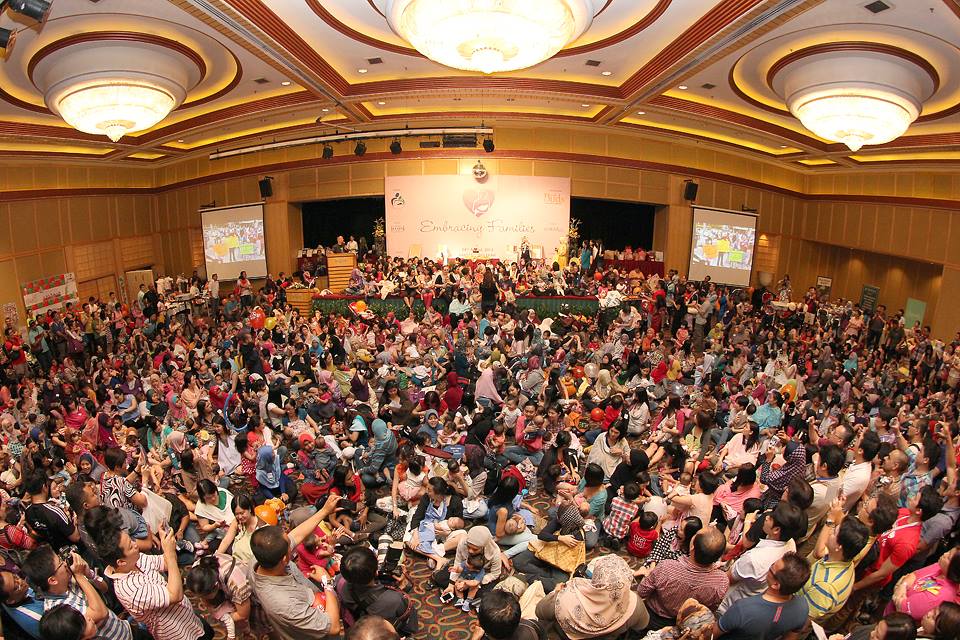
When TBAN got into the Malaysia Book of Records for organising the largest breastfeeding session in 2013, with 432 babies breastfed by their mothers in Grand Seasons Hotel, Kuala Lumpur.
You’ve seen a lot in all your years of breastfeeding counselling. Many fathers would say, well breastfeeding has nothing to do with me – I can’t help with anything! What would you say to that?
Twenty years ago in my groups there were hardly any dads there, but today if there are 20 to 40 people in my class, all dads come. I would say 99% of the time the dads come. And in my class, dads ask the most questions.
Aww! That’s so nice to know.
Yes, so there is a change. There’s a change in the way we think of our role as parents. Daddies are now very interested in what they can do. Dads are usually into gadgets, so I’ve seen them assemble all the pump parts and pass it to their wives. Or they support their wives by making sure there is the Korean drama serial they like to watch! And even if daddy cannot do anything, his presence is enough. We now have dads very willing to baby wear, very willing to change diapers. Every time TBAN has a diaper changing competition, it’s usually the dads who win!
How does that make you feel?
It’s marvellous! It feels wonderful. My husband was one of those first pioneering dads, with there with me in the room twenty years ago. We need all these fathers there to be encouraging to mothers.
By Laych Koh
Read the original article at makchic.com
|
Makchic is a mom-owned parenting platform that cultivates diverse yet relevant stories for urban parents. Made up of aspiring & talented women who support and uplift mothers and enrich families everywhere, they strongly believe in authentic, uplifting narratives that contribute to their community of readers. For more parenthood stories and information, visit makchic.com and follow them on Instagram, Facebook and Twitter. |




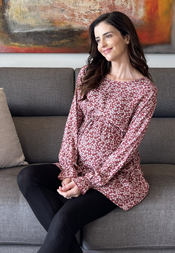

![[Interview] Gina Yong: Dads now ask the most questions in my breastfeeding classes](https://www.9monthsmaternity.com/media/blog/interview-gina-yong-3.jpg)
